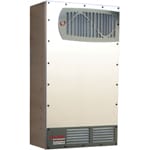What size inverter is recommended for AC well pumps?
If you’ve ever tried to power an AC well pump with an inverter, you already know how confusing it can be.
You want to avoid underpowering your pump, spending money on an inverter that can’t handle the job, or worse.
Getting the right inverter size for your AC well pump basically revolves around three factors: how much power your pump uses, how long it runs, and how much surge power it needs to start up.
Keep reading to learn what size inverter is recommended for AC well pumps and the models that work best for different pump sizes.
How Does an Inverter Work for AC Well Pumps?
An inverter is a device that converts DC (direct current) electricity, typically stored in batteries, into AC (alternating current) electricity that can be used by household appliances.
Well pumps, which run on AC power, require an inverter to operate in off-grid systems or during power outages.
How to Choose the Right Size of Inverter for AC Well Pumps
The size of the inverter required for your AC well pump depends on a few critical factors:
-
Wattage of the Pump: Inverter sizes are rated by their wattage capacity. To select the right inverter, you must know the wattage of your well pump. Typically, residential well pumps range from 0.5 HP (370 watts) to 2 HP (1,500 watts), but the exact wattage varies depending on the pump size.
-
Surge Requirements: Well pumps, especially those with motors, require an inverter that can handle high surge or peak loads when the motor starts. This is important to ensure the inverter can provide enough power to start the pump without causing damage or tripping the circuit.
-
Battery Capacity: The inverter must be compatible with the battery bank's voltage and current capacity. A mismatch can lead to inefficiencies and possible damage to the system.
-
Power Factor and Efficiency: The efficiency of your inverter also matters. A high-efficiency inverter ensures that you’re not wasting power, and it helps to extend the life of your battery system.
Using an Inverter Size Calculator
To make the process easier, you can use an Inverter Size Calculator, which takes into account the pump's wattage, surge requirements, and battery voltage. There are many of these tools available online. A popular option is the WatBuild.
The tool can help you accurately determine the size of the inverter you need for your well pump system. However, the downside is that they are not always reliable and may not give you a more precise idea than when you calculate it yourself. And, we’ve helped you do that by providing an inverter size chart:
Using the Inverter Size Chart
Detailed Power Requirements Chart
This chart provides an easy reference for matching your well pump's power requirements with the appropriate inverter size:
| Pump Wattage (HP) | Continuous Power Requirement | Surge Requirement (Starting Wattage) | Recommended Inverter Size |
|---|---|---|---|
| 0.5 HP | 370 Watts | 740 Watts | 1000W – 1500W |
| 1 HP | 750 Watts | 1500 Watts | 2000W – 2500W |
| 1.5 HP | 1125 Watts | 2250 Watts | 3000W – 3500W |
| 2 HP | 1500 Watts | 3000 Watts | 4000W – 4500W |
Professional Minimum Rating Chart
Use this chart as a guide to minimum inverter sizing for AC submersible well pumps (with no additional loads):
|
HP of Pump
|
Min. Rating of Modified-Sine Wave Inverter (KW)
|
Min. Rating of Sine Wave Inverter (KW)
|
KW Max. Running Power (Watts)
|
|
0.5
|
2.0
|
1.5
|
970
|
|
0.75
|
2.4
|
2.0
|
1325
|
|
1.0
|
2.8
|
2.5
|
1600
|
|
1.5
|
4.5
|
4.0
|
2150
|
|
2.0
|
0
|
4.5
|
2650
|
An inverter sized by these minimum guidelines will lower its voltage during the initial starting surge. This is not harmful, but it may cause lights to dim. To eliminate voltage dips, oversize the inverter by an additional 50% minimum, plus the watts capacity required to handle other household loads at the same time.
As a general rule, always choose an inverter with a higher surge capacity than the calculated value to ensure reliable performance.
Most well pumps require 230 VAC. Either two stacked inverters, or an inverter with 230V output, or a transformer must be used. Another method to avoid the typical surge of an AC pump is to have a "soft start control box" this will allow a much smaller inverter to be used since the surge is reduced by increasing the amps to the pump gradually during initial start up.
Special Considerations for Well Pump Inverters
Modified Sine Wave Considerations: If a "modified sine wave" inverter is to be used and the pump's control box is labeled "solid state," then it must be changed. Obtain a relay-type control box or a relay conversion kit from any pump supplier. If the pump is a "two-wire" type (having no control box), oversize the inverter by an additional 50%. A two-wire pump may not always work on a modified sine inverter.
Other Inverter Brands: Other brands of inverters differ in their surge capacity relative to continuous rating. Exact starting capacity is difficult to predict, and inverter manufacturers are hesitant to specify it.
Top 5 Inverters for AC Well Pumps
Now that you understand the key factors in selecting the right inverter size for your AC well pump, it's time to explore some of our best inverter options.
1. EG4 6000XP 2-Phase Hybrid Inverter/Charger (6KW)
This EG4 6000XP 2-Phase Hybrid Inverter/Charger (6KW) inverter is ideal for those with larger well pumps or off-grid systems that demand a high power output.
It offers the advantage of both AC and DC connections and works in both grid-connected and off-grid modes, providing a versatile solution.
Buy if…
-
You need a hybrid inverter that provides both grid-tied and off-grid capabilities.
-
You're working with large well pumps that require 240V output.
-
You want flexibility for future upgrades or expansions in your power system.
-
Surge capacity is essential, as this inverter is capable of handling significant loads during startup.
2. FLEX1 VFXR3524A FM80 3500W, 24V
The FLEX1 VFXR3524A is a great choice for homeowners looking to power medium-sized well pumps with a 24V battery bank. It comes pre-wired with an 80-amp charge controller, making it a convenient and effective option for residential use.
Buy if…
-
You need a well-balanced power system for medium-sized well pumps.
-
You have limited space and prefer a pre-wired system for easy installation.
-
You want an inverter that’s reliable for 24V setups.
-
You’re looking for an efficient inverter that balances cost and performance.
3. Cotek SD2500-124, 2500W 24VDC 115VAC
The Cotek SD2500-124 is a solid option for those seeking a balance between affordability and reliability. This pure sine wave inverter provides a clean power supply for sensitive electronics, such as well pumps, ensuring smooth operation.
Buy if…
-
You’re looking for a more affordable inverter for smaller, residential well pumps.
-
You have a 24V system and need a pure sine wave inverter for smooth, efficient pump operation.
-
Surge capability is important for motor-driven pumps.
-
You're on a budget but still need reliable performance for everyday use.
4. Outback FXR3048A Off Grid/Grid Tie Inverter Charger (3000W)
The Outback FXR3048A is perfect for users who need a flexible solution that can work both off-grid and with a grid connection.
With a 3000W capacity and excellent surge handling, this inverter ensures your well pump operates without interruption.
Buy if…
-
You want a hybrid inverter suitable for both grid-tied and off-grid systems.
-
You’re powering larger well pumps with a steady, reliable power source.
-
You need an inverter that can handle high surge loads without issue.
-
You prefer a reputable brand with a long track record of durability and performance.
5. Magnum Energy MS2024, 2000 Watts, 24V
The Magnum Energy MS2024 is a reliable choice for smaller well pumps or systems with less demanding energy needs. With its pure sine wave output, it ensures smooth operation and minimizes potential damage to sensitive devices.
Buy if…
-
You have smaller well pumps and a 24V battery setup.
-
You need a budget-friendly inverter for home use.
-
You prioritize reliability and ease of installation.
-
Your system is used for relatively short periods of pump operation.
Alternative Solutions to Consider
If all of this is too expensive for your situation, consider replacing it with a lower power solar pump, which is much more efficient and carefully selected for the best efficiency (watts per gallon). You can also consider an intermediary storage tank with a DC pressurizing pump.
The use of a storage tank or cistern will relieve your well pump from the need to start every time the pressure runs low (many times per day). You can pump into the storage tank just once or twice per week, and then use a DC pump to supply the water pressure as needed (or use gravity flow, if feasible). You may also be able to change to a lower power well pump, even a DC well pump, after this step is taken, because less pressure and less flow will be required from the well pump.
FAQ
1. How big of an inverter do I need to run a well pump?
The size of the inverter required to run a well pump depends on the pump's wattage and surge requirements. As a general guideline:
- For a 0.5 HP pump, you would need an inverter with a continuous power output of around 1000W and a surge capacity of at least 1500W
- For a 1 HP pump, the inverter should provide about 2000W continuous power with a surge capacity of 3000W
- Larger pumps, such as a 2 HP pump, will require inverters with continuous ratings of 4000W or higher and surge capacities of 6000W or more.
2. Can a 1000W inverter run a water pump?
A 1000W inverter can run a small water pump, such as a 0.5 HP pump, which typically consumes around 370W of continuous power and has a surge of around 740W. However, it may struggle with larger pumps or pumps that require higher surge capacities. Check the specific wattage and surge ratings of your pump before choosing an inverter.
3. Can a 5kVA inverter power a borehole pump?
A 5kVA inverter, which is roughly equivalent to 4000W of continuous power, can power smaller to medium-sized borehole pumps. A 1.5 HP borehole pump, which requires around 1200 to 1500W continuously and has a surge requirement of 3000W, can typically run on a 5kVA inverter.
At the Solar Store, we will be happy to help find the products that are right for you. For pricing and product information, give us a call. We'll also answer any questions you might have about your system. 1 (541) 388 3637


